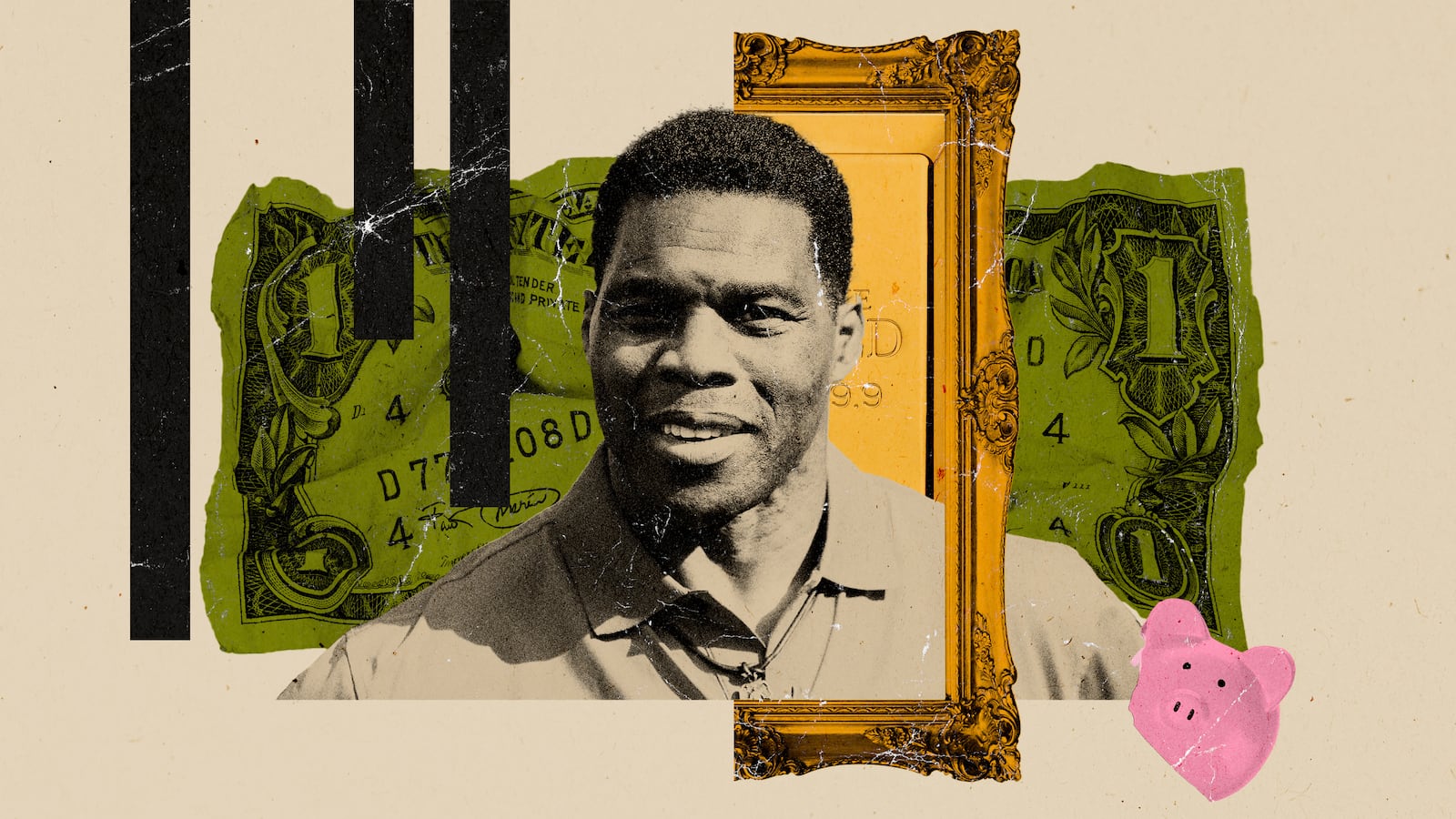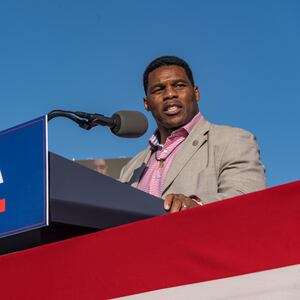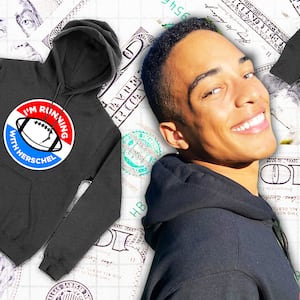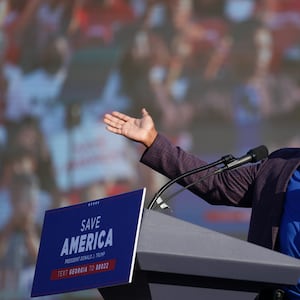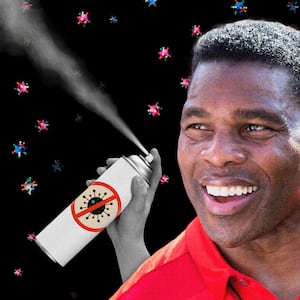Former NFL star Herschel Walker has made millions in business ventures since he retired in 1997, and he claims to be worth more than $29 million today.
But despite that success, the Republican Senate hopeful and longtime friend of Donald Trump has, for whatever reason, chosen to dramatically inflate his business record, according to a Daily Beast investigation. In doing so, Walker has established a parallel record of demonstrably false claims, many of which appear to bear no resemblance to reality whatsoever.
While Walker’s business record has been picked over before—including in an Associated Press review of “exaggerated claims of financial success”—The Daily Beast has reviewed documents and other records that shine new light on previously unexamined, and particularly egregious, false claims.
Those claims include running the largest minority-owned food company in the United States; owning multiple chicken plants in another state; and starting and owning an upholstery business which was also, apparently, at one point in his telling, the country’s largest minority-owned apparel company.
While the chasm between Walker’s vision and reality often appears staggering—and applies not just to business but to multiple dimensions of his personal life as well—he might be playing fast and loose with the concept of “ownership.” But it’s unclear whether he transposed this fanciful structure onto his candidate financial disclosure, which claims a net worth of between $29 million and $65 million, and which, according to a Georgia Public Broadcasting report, merits further scrutiny.

Herschel Walker walks off the stage during a rally featuring former US President Donald Trump on September 25, 2021 in Perry, Georgia.
Sean Rayford/GettyThe claims about the upholstery business appear particularly divorced from the truth, as that business, as Walker describes it, doesn’t appear to exist.
According to a review of business records, that company—either Renaissance Manufacturing or Renaissance Hospitality, depending on the telling (though both are now dissolved)—was not his in any common sense of ownership; it was part of a business arrangement with the true owner.
That fact didn’t deter Walker from boasting again and again that it was his company, repeatedly implying sole proprietorship—even saying as recently as a speech this February that he “started” the business.
“I started this little [inaudible] drapery company, where I still have about 250 people that sew drapery and bedspreads for me,” the former Olympic bobsledder told an audience at the University of North Texas on Feb. 10.
Two days before that, he told WRGA radio, “I built my own business, a very successful business, two businesses, a matter of fact, that I built them…. also in the drapery business, I built that one up as well.”
In a 2020 interview, Walker claimed he ran “the largest minority-owned apparel company.” He added that “we do drapers and bedspreads” and “have 280 women in Greer, South Carolina.”
In 2018, Walker told Fox Business he still was connected to an upholstery company. But according to the Atlanta Journal-Constitution, he had peeled away from his business deal the year prior.
Two years before that, Walker told the Dum Ass Club point-blank that he had the “largest upholstery company in the United States,” a claim so absurd it barely merits fact-checking.
Similar statements pop up again and again, going back several years. And even today, the website for his company—H. Walker Enterprises LLC—lists “textile fabrication” among its areas of expertise, claiming the “HWE and Renaissance Hospitality provides major hotels, restaurants and hospitals with custom fabric bedding, drapery and window treatments.”
It’s unclear, however, what business Walker is referencing, because Renaissance Hospitality dissolved last year. Walker also isn’t on the articles of dissolution; his friend and former business partner, George Mappin, is.
In fact, Walker’s mysterious claims about the upholstery company, which he “started,” appear to reference a now-defunct financial agreement he once had with Mappin’s other company, South Carolina-based Renaissance Manufacturing. But that company also dissolved last year.
And while Renaissance Manufacturing’s “about” page calls Walker “a great asset,” the same page notes, in reference to the Mappin clan, that the company “has been a family-owned business for five generations.” The Mappin family also lays claim to Renaissance Hospitality in filings with the Security and Exchange Commission.
(In 2005, Mappin embarked on another joint venture with Walker, called Sunutra, a company that would sell fruit and vegetable extracts for injection in other foods. Or, as Mappin put it to the Augusta Chronicle in 2005, “you can eat a chicken patty and get five doses of fruits and vegetables at the same time.”)
But The Daily Beast has found that Walker’s name does not appear on South Carolina business records associated with either Renaissance Manufacturing or Renaissance Hospitality. And records with Spartanburg and Greenville County reflect the same for deeds, mortgages, and liens.
The Atlanta Journal-Constitution also reported that Walker’s involvement with Renaissance Manufacturing ended after a bank dispute in 2017. And because both companies have since dissolved, it’s not at all clear what entity Walker was referencing on Feb. 10 when he said, “I still have about 250 people that sew drapery and bedspreads for me.”
The Daily Beast asked a Walker campaign spokesperson multiple times what company he was talking about, but did not get a response.
Of course, Walker’s concept of ownership appears to have always been loose.
For instance, the Heisman winner has—like his good friend Donald Trump—repeatedly inflated the size and revenue of another company, Renaissance Man Foods, including in statements on the campaign trail.

Herschel Walker and former president Donald J Trump hold a Save America rally in Perry, GA, United States on September 25, 2021
Peter Zay/Anadolu Agency via GettyOver the years, Walker has claimed numerous times, falsely, that Renaissance Man is the largest minority-owned food business in the country. And since launching his Senate bid last August, he’s said it was either the nation’s largest minority-owned food company, food service company, or chicken distributor at least five times. On Feb. 24, he told Savannah’s Fox 28 it was one of his top qualifications for the Senate.
“Well, people need to know about me. They know I’m a winner. They know what I work. Well, people need to know I started a company. People just think of me as a football player. I started a company that became the largest minority-owned food company in the United States,” Walker said.
In October, he told a UFC-themed podcast, “I own a food company—that’s going to freak you out—I own the largest minority-owned food company in the United States.”
The Daily Beast’s review shows that this is nowhere near accurate.
Walker, who claims to have also played Russian roulette half-a-dozen times, has never made the Fortune 500 cut, which has featured only 19 Black CEOs, ever. And Renaissance Man does not appear in a list of the largest 100 black-owned businesses in the country, maintained by Black Enterprise magazine.
Those 100 companies dwarf Renaissance Man. The largest in the food industry, Kentucky-based Bridgeman Foods, ranks sixth overall, with a reported $870 million in revenue and 20,000 employees. The seventh-largest overall, Thompson Hospitality, claims to be the “largest minority-owned food and facilities management company in the United States,” and in 2019, it reported more than $800 million in revenue. Fair Oaks Farms, number 11 overall, is—like Walker’s company—also in the poultry business. (Coca Cola Florida tops the list, but as a subsidiary of the larger corporation.)
By the Black Enterprise list, Walker’s company isn’t even the largest Black-owned food company in Georgia. That would be Smyrna-based TME Enterprises, 68th on the list with more than 680 employees and $40.7 million in revenue.
Asked for comment, a Walker campaign spokesperson replied, “That list you sent is black owned businesses, not specific to the food service industry as Herschel has been consistent in talking about.”
The Daily Beast replied with a link to the Fox 28 interview, and pointed out that the list includes Black-owned food companies.
The spokesperson replied that, “This story has already been written repeatedly by CNN and others, like The Daily Beast, who want to help Raphael Warnock get re-elected—you’re a couple months behind.”
While CNN does not appear to have broken any news about Walker business claims (AJC and the Associated Press have), the cable network did recently report that he has overstated his academic record for years.
“Herschel came from nothing, built one of the largest minority-owned food service companies in the United States and has lived the American Dream,” the spokesperson added, changing the claim. “That’s called a success story, unless, of course, you’re a Republican running for Senate.”
The Daily Beast asked the campaign for evidence to support the claim that the company ranks among the largest in that minority-owned category, but as of publication did not receive any.
According to a Jan. 2021 press release from the U.S. Census Bureau, Asian-owned businesses dominate the Accommodation and Food Services sector among minority groups, with $863.3 billion in revenue.
TME Enterprises would, however, appear to hang with Walker’s own depictions of Renaissance Man Foods, which has varied wildly depending on the context.
The Associated Press reported that, in recent interviews, Walker has touted annual revenues between $70 million and $80 million. But The Daily Beast obtained a deposition in federal court from 2019, where Walker pegged the combined net earnings of three related entities—Simmons Foods, Renaissance Man Foods, and H. Walker Enterprises—at $14 million. Further, that number was spread out between 2009 and 2017, for an annual average of about $1.5 million.
The AP also reported that Walker’s claim contradicts what he told the government in forgivable pandemic loan applications.

Herschel Walker attends a football game on September 11, 2021 in Athens, Georgia.
Brett Davis/GettyRenaissance Man Food reported eight employees on those documents—nowhere near the 600 he told Fox Business in 2018—and received a total $180,000 in loans. Walker’s candidate financial disclosure shows he drew a $100,000 salary from the company.
But it’s unclear whether Walker blurred any lines of ownership in his financial disclosure.
The chicken company, for instance, isn’t a tip-to-tail operation, but acts as a middleman between other services. Walker appears comfortable absorbing their stats into his own. For instance, the AJC reported that, in a 2018 lawsuit against his company, he revised his repeated statements about owning three chicken plants in Arkansas, explaining they belonged to a partner company.
“I don’t mean to speak of ‘own’ in a technical sense,” Walker said in that deposition.
This comports with The Daily Beast’s review of Arkansas corporate and real estate records, which show that Walker and his proprietary companies never established themselves or owned property in the state.
These are by far not the first specious business claims linked to Walker, which range from the serious to the bizarre.
The Daily Beast previously reported that the two-time Pro Bowler once hawked a “dry mist” COVID cure that would “kill any COVID on your body”—another echo of Trump, who floated the unscientific and dangerous internal use of disinfectants as a COVID prophylactic a few months before Walker’s pitch.
And The Daily Beast has also reported that his son, Christian Walker, slings “All American” apparel made overseas.
Despite Walker’s checkered business record—the Columbus Ledger-Enquirer recently reported he owed $625,000 in back loans for a pizza franchise—his Senate run has been profitable, personally and politically.
Since declaring his candidacy, Walker has made $175,000 for public appearances, Georgia Public Broadcasting reported—$75,000 more than his declared Renaissance Man Foods salary. And his campaign finance reports show that Walker’s shop hangs with the top campaigns in the country, hauling in more than $9 million between August and December.
Still, Walker finds himself behind. His Democratic rival, Sen. Raphael Warnock, is the biggest fundraising powerhouse in the Senate, ending 2021 with about $23 million in the bank.

